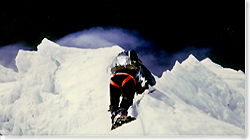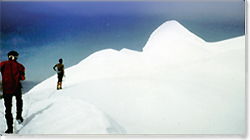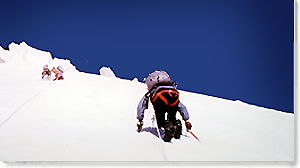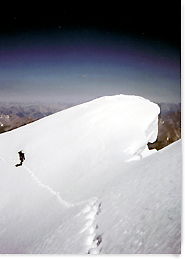|

Climbing Mount
Robson:
British Columbia's
Greatest Challenge – Climbing Mount Robson:
By Peter Austen
To climb
Mount Robson, by any route, is the dream of many North American climbers
and also of climbers throughout the world. Mount Robson is a peak of
world class reputation and mountaineering difficulty. The peak of almost
thirteen thousand feet is the highest in the Canadian Rockies and offers
difficult and objectively dangerous routes on all sides. There is a
constant threat from avalanches, icefall, and stonefall. The weather
can also change in a very short time from blues skies and sun to raging
blizzards and it plays a major part in any successful attempt. The first
ascent was led, in 1913, by Konrad Kain, an immigrant Austrian guide,
and was a very bold feat for the period. Mountaineers then had what
would now be called primitive equipment – nailed boots, a few sweaters
and ice axes that were far too long for their purpose. However, climbers
of that period made up for deficiencies in equipment by endurance, determination,
skill and sometimes very fast climbing.
 My
first attempt on Robson ended when I looked of the tiny mountain hut
perched on a ledge at eight thousand feet and saw six inches of new
snow at 6:00 a.m. My
first attempt on Robson ended when I looked of the tiny mountain hut
perched on a ledge at eight thousand feet and saw six inches of new
snow at 6:00 a.m.
I had come
on this second occasion in late August, the best time for climbing Robson,
with two Americans, Chris and Brock. They were both veterans of many
mountains but had not yet summitted on Robson after many attempts. For
some weird reason, American climbers pronounce Robson "Robeson." Perhaps
this is because of Paul Robeson, the great American Negro bass voiced
singer.
We met
at Kinney Lake that lies at the foot of the gigantic, almost Himalayan
ten thousand foot south face of Robson. Reverend Kinney was Robson's
first protagonist and got to within a few hundred feet of the summit
after a month long march from Edmonton. We toiled up the lower slopes
of dense bush, steep talus and rocky slabs for six hours. The sun was
merciless and we needed frequent rests. Reaching the hut at 2:00 p.m.
gave us the remainder of the afternoon to watch the show that Robson
puts on for interested spectators.  Near
the hut is a latrine from which you watch with bated breath as the icefall
spews out huge chunks of ice that break off and plummet into the depths.
The constant spectacle and roar of blocks means constipation is never
an issue. We sunbathed and watched the sunset on the myriad of jagged
peaks to the south. In the evening I calculated from the hut record
that only about thirty percent of the many attempts on Robon's summit
had been successful. In fact, during one ten year period, the weather
was so bad that no one climbed it all. Over the last five years only
thirty people have made the top compared to over 100 on Everest. At
12:00 p.m. we heard a noise outside and discovered a party of Chinese
mountaineers who, in true courteous Chinese tradition, had decided to
sleep outside rather than wake us up. They had just returned from the
summit after a very long day and were glad to come inside for a brew
of tea. Near
the hut is a latrine from which you watch with bated breath as the icefall
spews out huge chunks of ice that break off and plummet into the depths.
The constant spectacle and roar of blocks means constipation is never
an issue. We sunbathed and watched the sunset on the myriad of jagged
peaks to the south. In the evening I calculated from the hut record
that only about thirty percent of the many attempts on Robon's summit
had been successful. In fact, during one ten year period, the weather
was so bad that no one climbed it all. Over the last five years only
thirty people have made the top compared to over 100 on Everest. At
12:00 p.m. we heard a noise outside and discovered a party of Chinese
mountaineers who, in true courteous Chinese tradition, had decided to
sleep outside rather than wake us up. They had just returned from the
summit after a very long day and were glad to come inside for a brew
of tea.
We set
the alarm for 3:00 a.m. and set off in the frosty air, the snow cracking
under our boots and a weak glow from our headlamps revealed dragon-like
shapes riding in fairyland castles. The rock was loose and icy and led
to the summit of Little Robson, a subsidiary peak, which we reached
at around 5:00 a.m. From here snow slopes and small ridges led to the
"Schwarz" or black ledges. Here the fun starts.
 To
reach the first ledges, one has to pass under the "shooting gallery,"
a vertical corner of rock over which an icefield looms. Every few minutes
or even seconds in some cases, ice will break off, drop on the ledges,
and pulverize anyone who is unlucky enough to stand there. Then it cascades
five thousand feet down to the lower slopes of Mount Robson. We waited
until the "shooting" stopped and scooted across one by one at top speed
like frightened rabbits. To
reach the first ledges, one has to pass under the "shooting gallery,"
a vertical corner of rock over which an icefield looms. Every few minutes
or even seconds in some cases, ice will break off, drop on the ledges,
and pulverize anyone who is unlucky enough to stand there. Then it cascades
five thousand feet down to the lower slopes of Mount Robson. We waited
until the "shooting" stopped and scooted across one by one at top speed
like frightened rabbits.
Above the
Schwarz ledges is a snow ridge which seems to hang suspended over the
enormous drop below. Ravens show off constantly and drop like stones
a short distance away, leveling out thousands of feet lower. This always
gives me a sickening feeling in the stomach and I rammed my iceaxes
in even deeper. Many people say they can not stand height, but the thrill
comes from deliberately looking down and overcoming their fear.
A thousand
feet below the summit there is a long crossing under a giant icefall
and we blasted across this to reach the final sixty degree steep ice
ridge leading to the summit. This ridge can be any consistency from
soft snow to hard ice and in fact it was – solid ice. We had to place
ice screws every twenty-five feet for protection. After two hours of
this we emerged on to the summit ridge, feeling the effects of reduced
oxygen and a too fast ascent. The last hundred feet led to the summit
and we sat there, one at a time as the summit only has room for one
person. "Good grief, said Chris, what an amazing place." No one else
said much on the top. It was so overwhelming. Kinney Lake glinted like
a lost diamond, ten thousand feet directly below. It felt like hanging
on a plane's wing. Clouds drifted in and caused a bizarre feeling of
unreality.
The descent
was tricky as it was late afternoon, and everything was melting. We
dreaded the ever present threat of avalanche and icefall. Stones were
falling at intervals and fatigue was taking its toll. We had to be especially
careful anchoring each other down the ice and snow ridges. Climbing
down is very different from climbing up and we spent hours finding the
way down in the mist. The hut was reached six hours after leaving the
summit and we fell asleep after numerous drinks of tea and soup. Lunch
time next day saw us swimming in icy cold Kinney Lake, looking back
up at the gargoyles sculptured by the eroding wind on the top. My dream
of climbing the highest and most challenging peak in British Columbia
had been realized.
|



 My
first attempt on Robson ended when I looked of the tiny mountain hut
perched on a ledge at eight thousand feet and saw six inches of new
snow at 6:00 a.m.
My
first attempt on Robson ended when I looked of the tiny mountain hut
perched on a ledge at eight thousand feet and saw six inches of new
snow at 6:00 a.m.  Near
the hut is a latrine from which you watch with bated breath as the icefall
spews out huge chunks of ice that break off and plummet into the depths.
The constant spectacle and roar of blocks means constipation is never
an issue. We sunbathed and watched the sunset on the myriad of jagged
peaks to the south. In the evening I calculated from the hut record
that only about thirty percent of the many attempts on Robon's summit
had been successful. In fact, during one ten year period, the weather
was so bad that no one climbed it all. Over the last five years only
thirty people have made the top compared to over 100 on Everest. At
12:00 p.m. we heard a noise outside and discovered a party of Chinese
mountaineers who, in true courteous Chinese tradition, had decided to
sleep outside rather than wake us up. They had just returned from the
summit after a very long day and were glad to come inside for a brew
of tea.
Near
the hut is a latrine from which you watch with bated breath as the icefall
spews out huge chunks of ice that break off and plummet into the depths.
The constant spectacle and roar of blocks means constipation is never
an issue. We sunbathed and watched the sunset on the myriad of jagged
peaks to the south. In the evening I calculated from the hut record
that only about thirty percent of the many attempts on Robon's summit
had been successful. In fact, during one ten year period, the weather
was so bad that no one climbed it all. Over the last five years only
thirty people have made the top compared to over 100 on Everest. At
12:00 p.m. we heard a noise outside and discovered a party of Chinese
mountaineers who, in true courteous Chinese tradition, had decided to
sleep outside rather than wake us up. They had just returned from the
summit after a very long day and were glad to come inside for a brew
of tea.  To
reach the first ledges, one has to pass under the "shooting gallery,"
a vertical corner of rock over which an icefield looms. Every few minutes
or even seconds in some cases, ice will break off, drop on the ledges,
and pulverize anyone who is unlucky enough to stand there. Then it cascades
five thousand feet down to the lower slopes of Mount Robson. We waited
until the "shooting" stopped and scooted across one by one at top speed
like frightened rabbits.
To
reach the first ledges, one has to pass under the "shooting gallery,"
a vertical corner of rock over which an icefield looms. Every few minutes
or even seconds in some cases, ice will break off, drop on the ledges,
and pulverize anyone who is unlucky enough to stand there. Then it cascades
five thousand feet down to the lower slopes of Mount Robson. We waited
until the "shooting" stopped and scooted across one by one at top speed
like frightened rabbits.